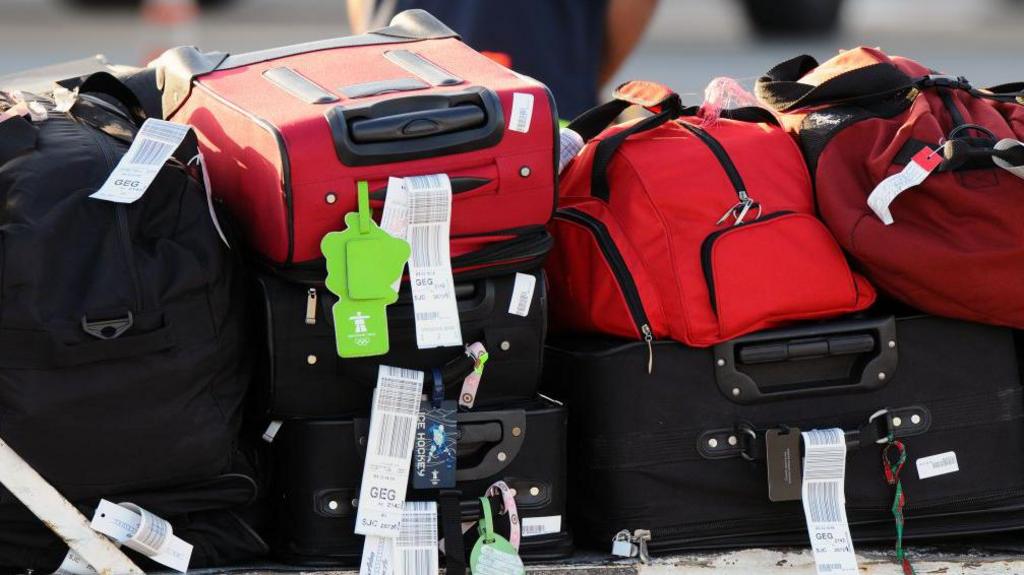Air Canada and Southwest’s recent implementation of checked baggage fees highlights a growing concern: the escalating cost of ancillary fees, often termed “junk fees,” is fueling outrage among politicians and consumer advocates. Simultaneously, sales of carry-on sized luggage are experiencing a significant surge.
Lauren Alexander, a traveler from Boston to Toronto, voiced her frustration, calling the added charges “ridiculous.” The 24-year-old explained, “It feels like a trick. You buy the ticket, thinking it’s cheaper, then face an extra $200 (£148) for a suitcase.”
To avoid this fee, Ms. Alexander opted for a small backpack. Twenty-seven-year-old Sage Riley echoed this sentiment, stating to the BBC, “It can be pricey.”
Jay Sorensen of IdeaWorks, a US aviation consultancy, notes a shift in airline practices. Checked bags, seat selection, and meals were once standard inclusions but have become increasingly monetized, particularly with the rise of budget airlines.
In 2006, UK budget carrier FlyBe pioneered the practice of charging for checked bags, initiating a trend quickly adopted by competitors. Established airlines followed suit, initially on shorter routes.
American Airlines initiated this practice in the US in 2008, charging $15 for the first checked bag on domestic flights.
Mr. Sorensen attributes this trend to competitive pressure from budget carriers, stating that established airlines felt compelled to implement similar strategies to remain competitive.
US airlines generated $7.27 billion from checked baggage fees last year, according to federal data—a significant increase from $7 billion in 2023 and $5.76 billion in 2019.
This trend has spurred a rise in carry-on-only travel. Kirsty Glenn, managing director of Antler, a UK luggage firm, confirms a substantial increase in demand for smaller suitcases. She highlights the rapid sales of a new compact suitcase launched in April, attributing it to the growing popularity of hand luggage only travel.
Travel journalist Chelsea Dickenson, whose TikTok content focuses on travel packing, has observed a parallel surge in social media interest in carry-on-sized luggage and packing hacks. She notes the significant impact of social media on promoting this trend.
Ms. Dickenson, boasting nearly a million followers, acknowledges the unexpected popularity of her luggage-focused videos. She states that the content resonates strongly with her audience.
The International Air Transport Association (IATA) projects that total airline ancillary fees, encompassing luggage, seat selection, Wi-Fi, lounge access, upgrades, and food and beverage, will reach $145 billion this year—14% of industry revenue.
This financial impact has drawn the attention of US politicians. Last December, airline executives faced questioning before a Senate committee, where the term “junk fees” was used to describe these charges.
Calls for federal review and potential fines have been made, but a response from the US Department of Transportation remains pending.
Adding to the issue, several airlines are now charging for hand luggage. Ryanair, for example, only allows a small under-seat bag free of charge, charging extra for larger carry-on bags.
EasyJet, Norwegian Airlines, Transavia, Volotea, Vueling, and Wizzair have adopted similar practices, prompting a complaint from the European Consumer Organisation (BEUC) to the European Commission.
BEUC cites a 2014 EU Court of Justice ruling that prohibits surcharges for hand luggage meeting reasonable size and weight requirements. However, the definition of “reasonable requirements” remains ambiguous.
In contrast, IndiGo, an Indian airline, offers a different approach, foregoing checked baggage fees. CEO Pieter Eibers highlights this as a key differentiator, aiming to streamline processes and improve efficiency.
The flight’s captain called ahead for medical assistance and the plane “landed normally” in southern Germany.
The ferry made its maiden voyage from Guernsey to Jersey, six days later than originally planned.
The plane maker has agreed to pay $1.1bn to avoid prosecution over two fatal crashes that killed 346 people.
The mayor says it “can’t replace every commercial route” as five others are at risk of being withdrawn.
Rail cash could be en-route to Wales next week, but rail money that’s not will keep causing a row.

